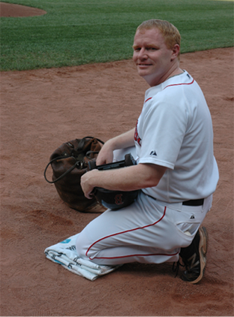Interview with Chris Cundiff, Fenway Park Batboy
This article was written by Bill Nowlin
This article was published in The SABR Book of Umpires and Umpiring (2017)
 Interview with Chris Cundiff by Bill Nowlin on August 16, 2015.
Interview with Chris Cundiff by Bill Nowlin on August 16, 2015.
I started working as the Red Sox batboy in 1992. I used to help Dean [Lewis] wait on the umpires, so I know most of them. I’ll stop down there and say hello. They’re all pretty good. Always exceptions.
After Dean rubs up the balls and the umpires inspect them, the authenticator usually brings them to me. Sometimes a security guard brings them across the field to me. Once it got screwed up and nobody brought them to me, so there was a little bit of a panic.
I start with 60. Five dozen. Dean’s also done maybe 10 or 12 extra dozen sitting around. We probably use 90, maybe 120 a game. Before the game, I keep the ball bag by the manager’s bench in the Red Sox dugout. When the game starts, they’re on the field with me the whole game. I probably sit them about five feet out from the wall. I’ve been using the same bag since the beginning, the original handles and everything. Had to have it get repaired a couple of times, but it’s the very same bag.
I’m both batboy and ballboy. The umpire usually signals that he wants three balls. I keep a running tally. If they foul one off, it’s four, so I usually go with one more, and I usually keep a couple in my pocket. If I run out to get a bat, and I know he needs two, I’ll give them to him. The thing that throws you off is when it gets fouled off to the visitor’s side and there’s nobody there to get it, I’ve got to run over and get it and then I don’t have the balls with me. So if I’m stuck over there and they need a couple, I can do something to keep the game moving along. I don’t want to break the rhythm, whether it’s the pitcher or the hitting. You just try to get in and out of there as quick as you can. There’s always this weird dichotomy of what they throw out. If the ball is hit, they won’t throw it out, but if it’s fouled…it’s weird, the same damage is done to the ball.
Recently, the ground crew started bringing water out to the umpires, which is great. You’ve got two minutes between innings so you’ve got to run it around and then get back around and collect the bottles, too. I always keep one behind the bag for the home-plate guy. Yesterday he needed water almost every half-inning. If the home-plate guy has to leave the field in between innings, I’ll stand at the plate with some balls while they’re warming up so if they throw it in the dirt, I’ll have another ball. They’re pretty quick about getting back after leaving.
I’ll joke with them throughout the game. You’ve got nothing else to do when you’re stuck out there for three hours. We usually have running jokes about the time of game. They don’t care who wins, but — especially if we’re [Red Sox] up, I’ll go, “Can we have a couple of strikes so we can get out of here a little quicker?” I probably said stuff that could get me ejected, but they know I’m joking. If someone gets really mad at them, I’ll say, “I don’t think he agreed with your call there. I’m just going out on a limb with that one.”
I interact with them more than I do with the players during the game. They’ll ask how my kids are doing. You’ll know some things about their family. When John Hirschbeck’s son Michael died, he’d batboy’d with me a few times. He was a big Cleveland Indians fan, but he loved it here, too. He probably batboy’d about four times. I know where certain ones of them go drinking, where they hang out at, where they’re going to go eat. I’m from Kentucky originally, and there’s like seven umps from Kentucky so I’ll talk to them about down there. I get along with most of them pretty well.
BILL NOWLIN, known to none as “The Old Arbiter” since he has never worked a game behind the plate, still favors the balloon chest protector for its nostalgic aesthetics. Aside from a dozen years as a college professor, his primary life’s work was as a co-founder of Rounder Records (it got him inducted into the Bluegrass Music Hall of Fame). He’s written or edited more than 50 books, mostly on baseball, and has been on the Board of Directors of SABR since the magic Red Sox year of 2004.


